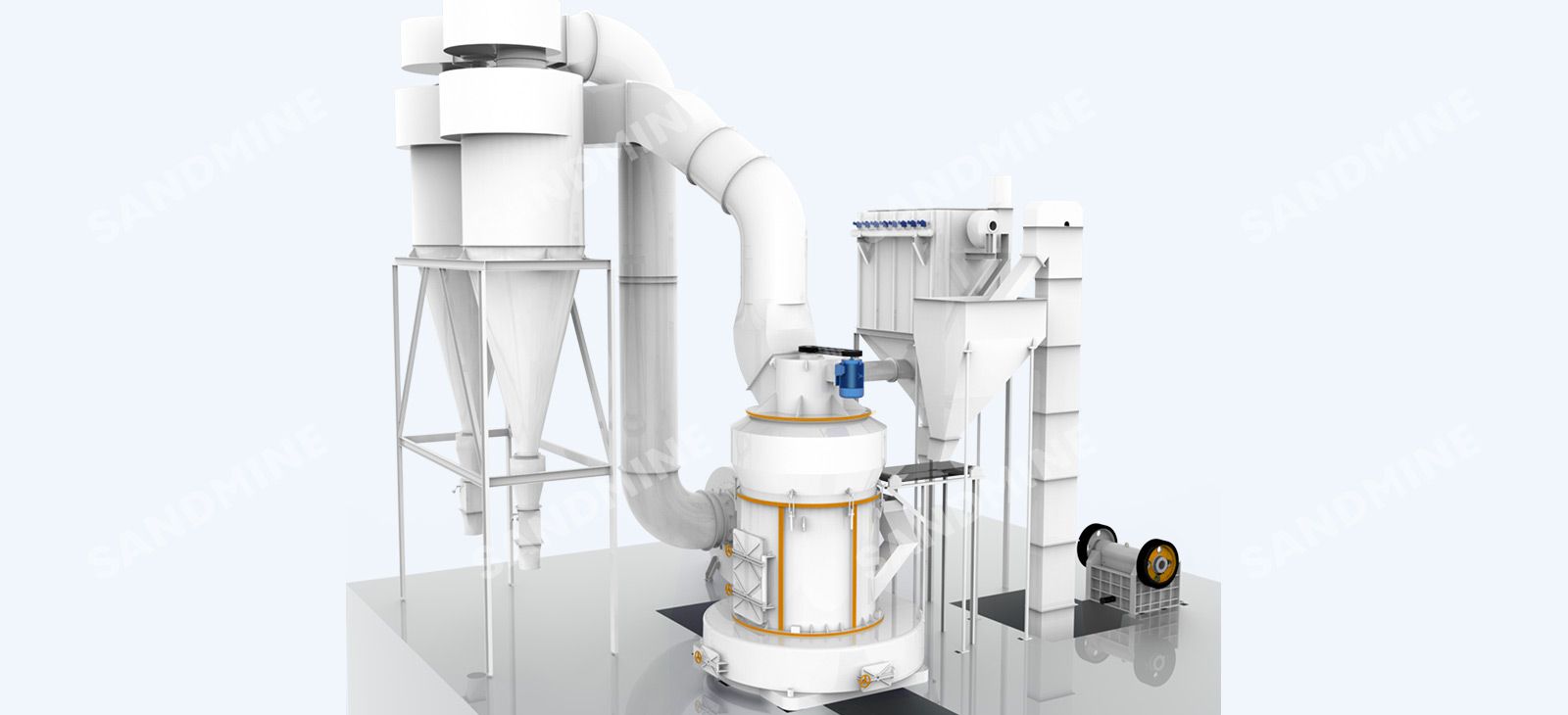
This solution is suitable for limestone, calcite, heavy calcium, coal, bentonite and other materials.




Industrial powder processing plays important role in today's industrial production. With the continuous progress of science and technology, industrial powder making has become a key part in many industries, such as medicine, food, chemical, ceramics, minerals and other fields. In these fields, the powder making quality directly affects the final products' quality, performance and production cost.
The process of industrial powder making includes crushing, grinding, grading, collecting and packing, among which grinding is the key step. Choose the right grinding equipment is very important according to different material characteristics and product needs.
As a professional manufacturer of industrial powder making equipment, Sandmine has a series of high-efficiency, energy-saving and environmentally friendly milling equipment, such as German type heavy duty grinding mill, German type super fine roller mill, German type super fine vertical mill, ball mill, etc., which can meet the needs of different customers. In addition, Sandmine also provides one-stop professional industrial powder making solution, includes process design, equipment selection, installation, commissioning and after-sales service to help customers get advantages in the highly competitive market, while achieve green production and sustainable development.

This solution is suitable for limestone, calcite, heavy calcium, coal, bentonite and other materials.
This process is for reference only. Depending on different material, usage and discharge size, we can customize the process and configure appropriate equipment for you.
Material disposal plan
The main component of limestone is calcium carbonate, which exists in the natural world mainly in the form of calcite and aragonite. Limestone has excellent properties such as thermal conductivity, firmness, water absorption, air permeability, sound insulation, polishing, good cementation properties and machinability, which can be directly used or deep processing applications. After grinding into powder, it can be used as filling material for rubber, plastic, paper, toothpaste, cosmetics and many other daily necessities. In chemical industry, it can be used to make alkali, bleaching powder, etc. Used in agriculture to improve soil; and used as an adsorbent in environmental protection industry, etc., in short, it is widely used in many fields.
Calcite is the most common natural calcium carbonate mineral, widely distributed in nature, and its name comes from it is easy to be broken into small square pieces along its cleavage. Calcite has attracted much attention because of its unique properties and wide applicability. Calcite is widely used in construction and civil engineering because of its high strength, wear resistance and corrosion resistance. Calcite has a unique crystal shape and beautiful appearance, so it is also used to make jewelry and crafts; calcite can be used as chemical raw materials for the production of various chemical products; it can also be used as agricultural fertilizer to provide calcium and other essential elements for plants; it also has applications in medical care, environmental governance, optical instrument manufacturing and other fields.
Heavy calcium carbonate, for short is heavy calcium, is made of natural carbonate minerals such as calcite, marble, limestone after grinding, which is commonly used as a powdered inorganic filler. Heavy calcium has the advantages of high chemical purity, high inertness, not easy happen chemical reaction, with good thermal stability, will not decompose below 400℃, with high whiteness, low oil absorption rate, soft, dry, with low hardness and low wear value, good dispersion, etc., so it has a wide range of applications in the preparation of rubber, plastic, paint, water-based coatings, paper making, construction, fireproof ceiling, artificial marble, floor tile and so on.
Coal is a solid combustible mineral which was gradually formed after complex biochemical and physicochemical changes by the ancient plants buried underground. As the most widely distributed fossil energy in the world, coal has a wide range of applications. However, due to the combustion of coal will produce a lot of pollutants, such as sulfur oxide, nitrogen oxide and particulate matter, which has a serious impact on the environment and human health, so clean coal preparation technology came into being. Clean coal powder preparation technology is a process that subdivides coal into micron or even nanometer powder materials, and reduces pollutant emissions during combustion by changing the form and chemical properties. At present, clean coal powder is often used as fuel or raw material in coal-fired power generation, industrial boilers, coal gasification, and coal-fired batteries.
Bentonite is a non-metallic mineral with montmorillonite as its main mineral component, with a hardness of 1-2 and a density of 2-3g/cm3. Bentonite can be divided into sodium bentonite (alkaline soil), calcium bentonite (alkaline soil), natural bleach soil (acidic soil or acidic white soil) according to the cation exchange type, content and interlayer charge. Bentonite has strong adsorbability, expansibility and cation exchange ability, can be used as purification decolorizing agent, binder, thixotropic agent, suspension agent, stabilizer, filler, feed, catalyst, etc., is widely used in agriculture, paper making, cosmetics, pharmaceuticals, textiles, drilling and other fields, has the reputation of "universal soil".
Please fill in the form with your information and specific needs, which will help us to get in touch with you as soon as possible and provide you suitable solution and a reasonable equipment quote.